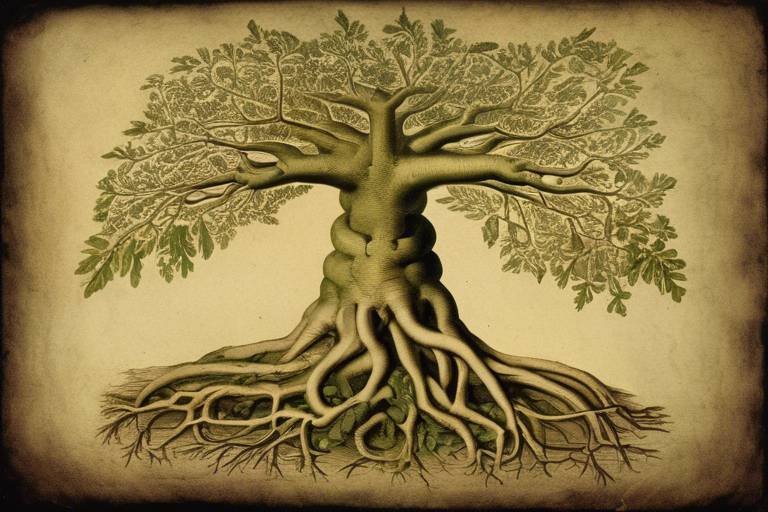Philosophy as the Mother of all Sciences
Philosophy, often regarded as the mother of all sciences, serves as the foundational bedrock upon which various fields of knowledge have been built. From the earliest days of human thought, philosophy has played a pivotal role in shaping our understanding of the universe, urging us to ask profound questions about existence, knowledge, and morality. Just as a mother nurtures her children, philosophy has nurtured the growth of scientific inquiry, providing the essential tools of reasoning and critical thinking that are indispensable in the pursuit of knowledge.
Imagine embarking on a journey through the vast landscape of human understanding. At the forefront, you find philosophy, standing tall as a guiding light. It encourages us to explore the “why” behind the “what”. While science deals with observable phenomena and empirical data, philosophy pushes us to ponder deeper implications and ethical considerations. This interplay between the two has been crucial throughout history, as philosophers have laid the groundwork for scientific methodologies that we still use today.
Throughout the ages, key philosophical inquiries have sparked revolutions in thought, leading to groundbreaking discoveries in various scientific disciplines. The ancient Greeks, for example, were not merely thinkers; they were the architects of a new way of understanding the world. Their inquiries into nature, existence, and the cosmos set the stage for the scientific method we cherish today. Without philosophy's guiding principles, many of the scientific advancements we take for granted might never have emerged.
Moreover, as we delve deeper into the relationship between philosophy and science, we uncover a rich tapestry woven with threads of inquiry, skepticism, and reason. Philosophy encourages scientists to question their assumptions and to seek clarity in their observations. It serves as a reminder that, at the heart of every scientific endeavor, there lies a philosophical question waiting to be explored. This dynamic relationship is not just historical; it continues to evolve, shaping the way we approach new challenges in both scientific and philosophical realms.
In essence, philosophy is not merely a relic of the past but a vibrant, living discipline that continues to influence modern science. It invites us to engage in a dialogue that transcends disciplinary boundaries, fostering an environment where interdisciplinary connections can flourish. As we navigate the complexities of our world, the insights gleaned from philosophical inquiry will remain critical in guiding scientific exploration and ethical considerations in research.
- What is the relationship between philosophy and science? Philosophy provides the foundational principles that guide scientific inquiry, encouraging critical thinking and ethical considerations.
- How did ancient philosophers influence modern science? Ancient philosophers laid the groundwork for scientific thought by exploring fundamental questions about existence, knowledge, and the nature of the universe.
- Why is philosophy considered the mother of all sciences? Philosophy is seen as the mother of all sciences because it encompasses the fundamental questions and methodologies that underpin various scientific disciplines.
- Can science exist without philosophy? While science can operate independently, it often lacks the critical frameworks and ethical considerations that philosophy provides, making their relationship essential.

The Historical Roots of Philosophy
Philosophy has long been regarded as the mother of all sciences, serving as the intellectual foundation upon which various fields of knowledge have been built. To truly appreciate the significance of philosophy in shaping scientific inquiry, we must journey back to ancient times, where the seeds of critical thought were sown by remarkable thinkers. These early philosophers, often referred to as the pre-Socratics, embarked on a quest to understand the universe not just through mythology, but through reason and observation.
Among these pioneers was Thales of Miletus, who is often credited as the first philosopher in Western history. Thales proposed that water was the fundamental substance of all things, marking a significant shift from mythological explanations to a more rational, scientific approach. This shift opened the floodgates for subsequent thinkers to explore the nature of reality, leading to the emergence of various schools of thought.
As we delve deeper into the historical roots of philosophy, we encounter figures like Heraclitus, who famously stated that "everything flows," emphasizing the constant change and evolution of the universe. His ideas on the nature of change laid the groundwork for future scientific inquiry into the dynamics of the physical world. Meanwhile, Parmenides countered this notion, arguing for the permanence of being, thus introducing a fundamental debate about the nature of existence that continues to resonate in philosophical discussions today.
Moving forward in time, we find ourselves in the era of Socrates, whose dialectical method of questioning not only influenced philosophy but also the scientific method itself. Socratic questioning encourages skepticism and critical thinking, essential components in the pursuit of knowledge. His student, Plato, further developed these ideas, proposing the existence of ideal forms and the importance of rational thought, which would later influence scientific theories about the nature of reality.
Aristotle, a student of Plato, took these philosophical concepts and applied them empirically, establishing a method of classification and observation that would become a cornerstone of modern science. His works spanned various disciplines, including biology, physics, and ethics, demonstrating the interconnectedness of philosophy and science. Aristotle’s emphasis on empirical observation paved the way for the scientific method, encouraging future generations to seek knowledge through observation and experimentation.
Throughout history, the interplay between philosophy and science has been a dynamic one, with each discipline informing and enriching the other. The contributions of these early philosophers laid the groundwork for a systematic approach to knowledge that continues to shape our understanding of the world today. Their ideas not only provoke thought but also inspire the scientific inquiries that drive technological advancements and societal progress.
In summary, the historical roots of philosophy are deeply intertwined with the development of scientific thought. From the early musings of pre-Socratic thinkers to the systematic approaches of Aristotle, each philosopher contributed to a legacy that emphasizes the importance of reason, observation, and critical inquiry. As we continue to explore the boundaries of knowledge, it is essential to recognize the profound impact that philosophy has had on the evolution of science.
- What is the main contribution of philosophy to science?
Philosophy provides the foundational principles of critical thinking and ethical considerations that guide scientific inquiry. - Who are some key philosophers that influenced science?
Notable philosophers include Aristotle, Descartes, and Kant, each contributing significantly to the methods and ethics of scientific practice. - How does philosophy affect modern scientific practices?
Philosophy encourages skepticism, promotes ethical standards, and fosters interdisciplinary dialogue, all of which are crucial for responsible scientific research.

Philosophy and the Scientific Method
The relationship between philosophy and the scientific method is like a dance; they move together, each influencing the other in profound ways. At its core, the scientific method is a systematic approach to inquiry that seeks to understand the natural world through observation, experimentation, and analysis. But where did this method come from? The roots of the scientific method are deeply embedded in philosophical inquiry. Philosophers have long been the architects of logical reasoning and critical thinking, laying the groundwork for how we approach science today.
Critical thinking and skepticism are not just accessories in the scientific process; they are essential components. Philosophers have taught us to question everything, to not take information at face value. This skepticism drives scientists to formulate hypotheses and seek evidence before drawing conclusions. Without this philosophical underpinning, scientific inquiry would lack the rigor and depth that it has today. The scientific method, therefore, is not merely a series of steps but a philosophical framework that encourages curiosity and demands proof.
Consider the steps of the scientific method: observation, hypothesis formulation, experimentation, and conclusion. Each of these steps is steeped in philosophical thought. For example, when scientists make observations, they rely on philosophical principles regarding what constitutes evidence and how to interpret it. Similarly, when they formulate hypotheses, they engage in a form of logical reasoning that has been honed over centuries by philosophers.
One could argue that the scientific method is a manifestation of philosophical principles in action. It embodies the idea that knowledge is provisional and subject to revision, a concept championed by philosophers like Karl Popper, who argued that scientific theories must be falsifiable. This notion of falsifiability is pivotal; it allows science to evolve and adapt, much like a living organism responding to its environment.
Moreover, the interplay between philosophy and science is not a one-way street. As science progresses, it poses new questions that challenge existing philosophical frameworks. For instance, advancements in quantum physics and genetics have led to profound ethical dilemmas that philosophers are now wrestling with. Questions about the nature of reality, free will, and the moral implications of scientific advancements are at the forefront of contemporary philosophical discourse.
In summary, the scientific method is a product of philosophical inquiry, and its effectiveness is enhanced by the critical thinking and skepticism that philosophy promotes. As we continue to explore the intricacies of the universe, the bond between philosophy and science will only grow stronger, shaping the future of inquiry and understanding.
- What is the scientific method?
The scientific method is a systematic approach to inquiry that involves observation, hypothesis formulation, experimentation, and conclusion. - How does philosophy influence science?
Philosophy provides the critical thinking and skepticism necessary for rigorous scientific inquiry, shaping how scientists formulate hypotheses and interpret data. - Can science exist without philosophy?
While science can operate independently, it lacks the depth and rigor that philosophical inquiry provides, making philosophy an essential component of scientific progress. - What role does ethics play in science?
Philosophical frameworks guide moral considerations in scientific research, addressing ethical dilemmas that arise from scientific advancements.

Key Philosophers in Science
When we think about the foundations of modern science, it’s impossible to ignore the profound influence of key philosophers who have shaped our understanding of the world. These thinkers didn’t just ponder abstract ideas; they laid the groundwork for rigorous scientific inquiry. Their thoughts and theories have permeated various scientific disciplines, offering frameworks that continue to guide researchers today. Let’s dive into the minds of a few pivotal figures, such as Aristotle, René Descartes, and Immanuel Kant, and explore how their contributions have sculpted the landscape of science.
Aristotle, often hailed as the father of Western philosophy, made significant strides in numerous fields, including biology, physics, and ethics. His empirical approach—rooted in observation and experience—established a systematic framework for studying the natural world. Aristotle’s classification of living organisms and his exploration of causality provided a foundation that many scientific fields still rely on today. For instance, his concept of the four causes—material, formal, efficient, and final—offers a comprehensive way to understand the complexities of natural phenomena.
Moving forward in time, we encounter René Descartes, a philosopher who emphasized reason as the primary path to knowledge. His famous declaration, “I think, therefore I am,” encapsulates his belief in the power of rational thought. Descartes championed a method of doubt, advocating that one should question everything that is not certain. This approach laid the groundwork for the scientific method, encouraging scientists to formulate hypotheses and seek evidence through experimentation. His dualistic view of the mind and body also sparked discussions that would influence psychology and cognitive science for centuries.
Another monumental figure, Immanuel Kant, introduced ideas that bridged the gap between rationalism and empiricism. Kant argued that while our understanding of the world is shaped by our experiences, there are innate structures in the mind that help us interpret these experiences. His work on the nature of scientific laws and the limits of human understanding prompted scientists to consider the philosophical implications of their findings. Kant’s insistence on the importance of ethical considerations in science also paved the way for discussions on the moral responsibilities of researchers.
| Philosopher | Key Contributions | Impact on Science |
|---|---|---|
| Aristotle | Empirical observation, classification of knowledge | Foundation for biology and natural sciences |
| René Descartes | Rationalism, method of doubt | Development of the scientific method |
| Immanuel Kant | Bridging rationalism and empiricism | Philosophical implications of scientific laws |
In summary, the contributions of these philosophers extend beyond their own eras, influencing generations of scientists and thinkers. Their ideas challenge us to think critically about our understanding of the universe and the methods we use to explore it. In a world where science and philosophy often seem at odds, it’s essential to recognize that they are, in fact, deeply interconnected. Philosophy provides the questions that science seeks to answer, while science offers empirical evidence to support or refute philosophical theories.
- How did philosophy influence the scientific method?
Philosophy provided the foundational principles of skepticism and critical thinking, essential for developing the scientific method. Philosophers like Descartes emphasized questioning assumptions, which is a core component of scientific inquiry. - Why is Aristotle considered the father of science?
Aristotle's empirical methods and systematic classification of knowledge laid the groundwork for various scientific disciplines, establishing a framework that is still relevant today. - What role does ethics play in science?
Ethical considerations, shaped by philosophical frameworks, guide researchers in making moral decisions about their work, ensuring that scientific advancements benefit society responsibly.

Aristotle's Contributions
Aristotle, often hailed as the father of Western philosophy, made profound contributions that laid the groundwork for various scientific disciplines. His approach was revolutionary for its time, emphasizing observation and empirical evidence as the cornerstones of knowledge. Imagine a world where questions were met with mere speculation; Aristotle changed that narrative by advocating for a systematic study of the natural world. He believed that understanding the universe required more than just abstract thought—it demanded careful observation and analysis.
One of Aristotle's most significant contributions was his method of classification. He categorized living organisms based on their similarities and differences, a practice that is foundational in the field of biology today. This classification system, which included the concepts of genus and species, allowed scientists to communicate effectively about different forms of life. The impact of his work can still be felt in modern taxonomy, where scientists organize and name organisms in a structured manner. To illustrate this point, consider the following table that summarizes some of Aristotle's key contributions to various fields:
| Field | Contribution |
|---|---|
| Biology | Classification of living organisms, introduction of taxonomy |
| Physics | Theory of motion and causality, distinction between different types of motion |
| Logic | Foundation of syllogistic reasoning, development of formal logic |
| Ethics | Concept of virtue ethics, emphasis on the importance of character |
In addition to classification, Aristotle's empirical approach extended to the study of physics. He proposed that all motion is caused by an external force, a notion that would dominate scientific thought until the work of Galileo and Newton centuries later. This idea of causality—understanding that every effect has a cause—became a fundamental principle in scientific inquiry. Aristotle's exploration of motion laid the groundwork for future experiments and theories, allowing later scientists to build upon his ideas.
Moreover, Aristotle's contributions to logic and reasoning cannot be overstated. He developed a system of formal logic that provided the tools for critical thinking and analysis. His syllogistic reasoning—a method of deductive reasoning—enabled scholars to derive conclusions from general premises. This logical framework is still taught in philosophy and mathematics today, proving that Aristotle's influence transcends time and discipline.
In the realm of ethics, Aristotle introduced the concept of virtue ethics, which emphasizes the importance of character and moral virtues in achieving a good life. He argued that ethical behavior is not merely about following rules but about cultivating virtues that lead to personal and communal flourishing. This philosophical stance has shaped modern ethical discussions, particularly in fields like bioethics, where moral considerations are paramount in scientific research and technology.
In summary, Aristotle's contributions extend far beyond his time, providing a robust framework for scientific inquiry and ethical considerations. His emphasis on observation, classification, and logical reasoning set the stage for future generations of thinkers and scientists. As we delve deeper into the realms of knowledge and discovery, we continue to stand on the shoulders of giants like Aristotle, whose ideas remain relevant and influential in today's scientific landscape.
- What was Aristotle's main contribution to science? Aristotle's main contribution was his empirical approach to studying the natural world, particularly through classification and observation.
- How did Aristotle influence modern biology? His classification system laid the groundwork for taxonomy, helping scientists organize and communicate about living organisms.
- What is virtue ethics? Virtue ethics is a philosophical approach that emphasizes the role of character and virtues in moral philosophy.
- Why is Aristotle considered the father of Western philosophy? He is considered the father of Western philosophy due to his extensive writings and foundational ideas that shaped various fields, including science, logic, and ethics.

Descartes and Rationalism
René Descartes, often hailed as the father of modern philosophy, made significant strides in the realm of rationalism, a school of thought that emphasizes reason as the primary source of knowledge. In a world where sensory experience can often deceive us, Descartes boldly asserted that true understanding must stem from clear and distinct ideas, which can only be grasped through rational thought. His famous dictum, "Cogito, ergo sum" (I think, therefore I am), encapsulates this philosophy, suggesting that the very act of thinking is proof of one's existence and a foundation for knowledge.
Descartes' approach was revolutionary for his time. He challenged the prevailing scholastic traditions that relied heavily on empirical observations and the teachings of ancient authorities. Instead, he proposed a method of systematic doubt, where one must question everything that can be doubted, leaving only that which is absolutely certain. This method not only laid the groundwork for modern scientific inquiry but also introduced a rigorous framework for critical analysis, which is essential in both philosophy and science.
To illustrate Descartes' impact on rationalism and its implications for scientific methodology, consider the following key contributions:
- Method of Doubt: Descartes encouraged questioning the validity of all beliefs until reaching an undeniable truth, fostering a culture of skepticism that is vital in scientific research.
- Analytical Geometry: His work in mathematics, particularly in developing analytical geometry, provided tools that would later be fundamental in physics and engineering.
- Dualism: Descartes introduced the concept of dualism, distinguishing between the mind and body, which spurred debates in both philosophy and psychology about the nature of consciousness.
Descartes' influence extends beyond philosophy into the very fabric of scientific thought. His insistence on clarity and logical reasoning paved the way for the scientific method, which relies on hypothesis testing and empirical validation. The principles he established have been instrumental in shaping disciplines such as physics, biology, and even psychology, creating a bridge between abstract thought and observable reality.
In essence, Descartes' rationalism serves as a reminder that while empirical observation is crucial, the power of reason and critical thinking cannot be underestimated. His legacy continues to resonate in contemporary debates about knowledge, existence, and the nature of reality, prompting us to consider how we acquire knowledge and the processes we use to validate our beliefs.
- What is rationalism? Rationalism is a philosophical approach that emphasizes reason as the primary source of knowledge, often contrasting with empiricism, which relies on sensory experience.
- How did Descartes influence modern science? Descartes' emphasis on skepticism and the method of doubt laid the groundwork for the scientific method, promoting critical thinking and systematic inquiry.
- What is the significance of "Cogito, ergo sum"? This statement encapsulates the idea that the act of thinking is proof of one's existence and serves as a foundational element in Descartes' philosophy.

Philosophy's Influence on Ethics in Science
When we think about science, we often envision laboratories, experiments, and groundbreaking discoveries. However, lurking behind every scientific endeavor is a profound philosophical question: What is the right thing to do? This inquiry is where ethics comes into play, and philosophy serves as the compass guiding scientists through the murky waters of moral dilemmas. Without philosophy, the scientific community would lack the framework necessary to navigate complex ethical issues that arise in research and application.
Consider this: every time a scientist decides to conduct an experiment, they are faced with ethical considerations. Should they use animals in their research? How do they ensure the safety and well-being of human subjects? These questions aren't just procedural; they are deeply philosophical. Philosophy encourages scientists to reflect on the implications of their work, fostering a culture of responsibility and accountability. It challenges them to weigh the potential benefits of their research against the risks and ethical costs involved.
Moreover, different philosophical frameworks provide distinct perspectives on ethics in science. For instance, utilitarianism suggests that actions are right if they promote the greatest happiness for the greatest number. This principle might lead scientists to prioritize research that benefits the majority, potentially sidelining minority interests. On the other hand, deontological ethics, rooted in Kantian philosophy, emphasizes duty and adherence to rules. This might encourage scientists to uphold strict ethical standards, regardless of the potential outcomes.
In addition to these frameworks, the role of scientific integrity cannot be overstated. Philosophical discussions around integrity challenge researchers to maintain honesty and transparency in their work. This is vital not only for the credibility of science but also for public trust. When scientists adhere to ethical guidelines, they help to foster a culture of respect and responsibility that extends beyond their individual projects. This ripple effect can influence how science is perceived and practiced on a global scale.
Furthermore, the relationship between philosophy and ethics in science is not static; it evolves with societal values and technological advancements. For instance, the rise of genetic engineering and artificial intelligence has sparked intense philosophical debates about the moral implications of these technologies. Should we edit the genes of unborn children? What ethical considerations arise from creating autonomous machines? These questions require a philosophical lens to navigate effectively, ensuring that scientific progress aligns with our ethical standards and societal norms.
To illustrate the dynamic interplay between philosophy and ethics in science, consider the following table that outlines key ethical principles derived from philosophical thought:
| Philosophical Framework | Key Ethical Principle | Application in Science |
|---|---|---|
| Utilitarianism | Greatest Happiness Principle | Prioritizing research that benefits the majority |
| Deontological Ethics | Duty and Moral Rules | Upholding strict ethical standards regardless of outcomes |
| Virtue Ethics | Character and Integrity | Encouraging honest and responsible scientific practices |
In conclusion, philosophy is not merely an abstract discipline; it is the bedrock upon which ethical scientific inquiry stands. By continuously engaging with philosophical questions, scientists can ensure that their work not only advances knowledge but also aligns with our collective moral compass. As we look to the future, the integration of philosophical ethics in scientific practice will be crucial in addressing the challenges posed by new technologies and societal changes.
- Why is ethics important in science?
Ethics is crucial in science to ensure that research is conducted responsibly and that the welfare of participants, whether human or animal, is prioritized. - How do philosophical frameworks influence scientific research?
Philosophical frameworks provide guidelines for ethical decision-making, helping scientists navigate complex moral dilemmas. - What role does integrity play in scientific ethics?
Integrity ensures that researchers maintain honesty and transparency, fostering trust in the scientific community and its findings.

Interdisciplinary Connections
Philosophy has a unique and pivotal role in bridging various fields of knowledge, creating a rich tapestry of interdisciplinary connections that enhance our understanding of the world. It acts as a lens through which we can examine the principles and assumptions that underpin different scientific disciplines. By fostering dialogue between philosophy and the sciences, we can better grasp the complexities of human existence and the universe at large.
For instance, in the realm of the social sciences, philosophical theories provide essential frameworks for analyzing human behavior. Take ethics, for example; philosophical inquiry into morality guides researchers in making decisions that affect individuals and communities. This ethical foundation is crucial when considering issues such as:
- Social justice
- Human rights
- Research ethics
These considerations not only shape the methodologies employed in social research but also influence the outcomes and implications of the findings. Without a philosophical perspective, the social sciences risk becoming detached from the ethical realities of human life.
Meanwhile, in the natural sciences, philosophy plays an equally significant role. Philosophical discussions regarding the nature of causality, the essence of existence, and the characteristics of scientific laws provide a robust foundation for scientific inquiry. For example, consider the debate surrounding the concept of causation:
| Philosophical View | Key Aspects |
|---|---|
| Empiricism | Knowledge is derived from sensory experience. |
| Rationalism | Reason and logic are the primary sources of knowledge. |
| Scientific Realism | Scientific theories aim to describe the world as it is. |
These philosophical perspectives influence how scientists formulate hypotheses, design experiments, and interpret data. By questioning the underlying assumptions of scientific theories, philosophers encourage scientists to think critically about their work, leading to more rigorous and innovative approaches to research.
The interplay between philosophy and science is not merely academic; it has real-world implications. As we face complex challenges such as climate change, artificial intelligence, and bioethics, the need for interdisciplinary collaboration becomes increasingly apparent. Philosophical inquiry can help clarify the ethical dimensions of these issues, guiding scientists and policymakers in making informed decisions that consider both the benefits and potential risks.
In conclusion, the connections between philosophy and various scientific fields are not just beneficial—they are essential. By integrating philosophical perspectives into scientific inquiry, we can foster a more holistic understanding of the world, ultimately enriching both our scientific and philosophical pursuits.
1. How does philosophy influence scientific research?
Philosophy influences scientific research by providing ethical frameworks, guiding critical thinking, and questioning underlying assumptions, which helps to refine methodologies and interpretations.
2. Can philosophy and science coexist?
Absolutely! Philosophy and science complement each other, with philosophy offering insights into the ethical and conceptual foundations of scientific inquiry.
3. Why is ethics important in science?
Ethics is crucial in science to ensure that research is conducted responsibly and that the rights and well-being of individuals and communities are protected.

Philosophy in Social Sciences
When we dive into the realm of social sciences, it becomes clear that philosophy plays an indispensable role in shaping our understanding of human behavior and societal structures. Think of philosophy as the lens through which we examine the intricate tapestry of human interactions. Without this lens, we might miss the subtle threads that connect our thoughts, actions, and the world around us.
At its core, philosophy in social sciences raises profound questions about human nature, morality, and the social constructs that govern our lives. For instance, consider the philosophical debates around free will versus determinism. This discussion not only influences psychology but also impacts law, politics, and ethics. Are our choices genuinely our own, or are they dictated by external factors? Such inquiries compel us to scrutinize the very foundations of our social systems.
Moreover, ethical considerations in social research are deeply rooted in philosophical thought. When researchers embark on studies involving human subjects, they are faced with critical ethical dilemmas. Questions such as "Is it right to manipulate variables affecting people's lives?" or "How do we ensure informed consent?" are not merely procedural; they require a philosophical approach to ethics. Philosophers like John Stuart Mill and Immanuel Kant have laid the groundwork for understanding these moral complexities, emphasizing the importance of individual rights and the greater good.
In addition, philosophy encourages a critical examination of the theoretical frameworks that underpin social sciences. For example, positivism, which advocates for observable phenomena as the basis of knowledge, contrasts sharply with interpretivism, which emphasizes understanding human behavior from the perspective of those experiencing it. This philosophical dichotomy not only shapes research methodologies but also influences how we interpret data and draw conclusions about societal trends.
Furthermore, the interplay between philosophy and social sciences fosters interdisciplinary dialogue. By engaging with philosophical theories, social scientists can explore new dimensions of their research. For instance, the integration of feminist philosophy into sociology has led to richer analyses of gender roles and power dynamics in society. Similarly, Marxist theory has profoundly influenced political science, offering critical insights into class struggles and economic systems.
In conclusion, the influence of philosophy in social sciences is both profound and multifaceted. It not only shapes our understanding of human behavior but also guides ethical practices and theoretical approaches. As we navigate the complexities of modern society, the philosophical questions we explore will continue to illuminate the paths we take in understanding ourselves and each other.
- How does philosophy influence social research? Philosophy provides the ethical framework and theoretical perspectives that guide social research methodologies and interpretations.
- What are some key philosophical theories relevant to social sciences? Key theories include positivism, interpretivism, feminism, and Marxism, each offering unique insights into human behavior and societal structures.
- Why is ethics important in social sciences? Ethics ensures that research is conducted responsibly, protecting the rights and dignity of participants while promoting integrity in findings.

Philosophy in Natural Sciences
When we think about the natural sciences, what often comes to mind are the hard facts and figures, the experiments and the data that drive our understanding of the universe. However, lurking behind every scientific discovery is a rich tapestry of philosophical inquiry that shapes how we interpret these findings. Philosophy provides the foundational questions that guide our exploration of the natural world. For instance, consider the fundamental questions of causality and existence. What does it mean for something to cause another event? How do we define the existence of a phenomenon? These inquiries are not just academic; they are essential for framing scientific research.
One of the most significant philosophical contributions to the natural sciences is the concept of scientific laws. These laws, which govern the behavior of the physical world, are not merely descriptive; they are prescriptive, guiding our expectations of how nature operates. Philosophers like David Hume challenged the notion of causality, suggesting that what we perceive as cause and effect may merely be a habit of thought rather than a fundamental truth. This kind of philosophical skepticism encourages scientists to remain vigilant in their assumptions and to continually question the validity of their conclusions.
Moreover, the relationship between philosophy and the natural sciences is a dynamic one. As new scientific discoveries emerge, philosophical frameworks must adapt and evolve. For instance, the advent of quantum mechanics not only revolutionized physics but also raised profound philosophical questions about the nature of reality and observation. Are particles real if they can exist in multiple states at once? What does it mean for a scientist to observe an experiment? These questions illustrate the deep interconnection between philosophical inquiry and scientific progress.
To further illustrate this relationship, let's consider a table summarizing key philosophical concepts that have influenced natural sciences:
| Philosopher | Key Concept | Impact on Natural Sciences |
|---|---|---|
| Aristotle | Empiricism | Established observational methods that are foundational in biology and physics. |
| Descartes | Rationalism | Emphasized reason as a tool for understanding the natural world, leading to systematic experimentation. |
| Hume | Causality | Questioned the nature of cause and effect, prompting critical examination of scientific assumptions. |
| Heisenberg | Uncertainty Principle | Challenged classical notions of determinism, influencing philosophical discussions on reality. |
In conclusion, the interplay between philosophy and the natural sciences is not just a historical footnote; it is a vibrant and essential dialogue that continues to shape our understanding of the world. As we delve deeper into the mysteries of nature, the philosophical questions we ask will guide our scientific inquiries, ensuring that we do not lose sight of the bigger picture. After all, the pursuit of knowledge is not just about accumulating data; it's about understanding our place in the universe and the principles that govern it.
- How does philosophy influence scientific research? Philosophy provides the foundational questions and frameworks that guide scientific inquiry, ensuring that researchers consider the implications of their findings.
- Are scientific laws absolute? No, scientific laws are subject to revision as new evidence emerges and our understanding of the natural world evolves.
- Can philosophy and science coexist? Absolutely! The two fields complement each other, with philosophy helping to clarify the assumptions and ethical considerations of scientific research.

The Future of Philosophy and Science
As we stand on the precipice of a new era in both philosophy and science, it is essential to recognize that the relationship between these two fields is not static; rather, it is a dynamic interplay that evolves with the times. The future of philosophy and science is poised for exciting developments, particularly as we grapple with unprecedented challenges such as climate change, artificial intelligence, and bioethics. Will philosophy continue to be the guiding light for scientific inquiry? Absolutely! Just as the ancient philosophers laid the groundwork for modern thought, today's philosophers are tasked with addressing the ethical implications of scientific advancements.
One of the most significant trends we can anticipate is the increasing integration of philosophy into scientific education and practice. As scientists confront complex ethical dilemmas, they will need to engage with philosophical frameworks that provide clarity and guidance. For instance, the rise of artificial intelligence raises profound questions about consciousness, free will, and moral responsibility. How do we ensure that AI operates within ethical boundaries? This is where philosophy steps in, offering critical insights that can shape the development of technology.
Moreover, interdisciplinary collaboration will become more crucial than ever. As scientific discoveries span multiple domains, the philosophical implications of these findings will require a broad perspective. Think of it like a grand symphony where each instrument plays a unique role, yet together they create a harmonious sound. In this context, philosophy serves as the conductor, ensuring that the various disciplines work together cohesively. The future will likely see more joint ventures between philosophers and scientists, fostering discussions that transcend traditional boundaries.
In addition, the quest for understanding the universe will continue to challenge our philosophical assumptions. As scientists delve deeper into the mysteries of quantum mechanics and cosmology, they will inevitably encounter questions that defy empirical measurement. What is the nature of reality? Is there a multiverse? These existential queries will push philosophers to refine their theories and adapt to new scientific paradigms. The dialogue between philosophy and science will thus be a two-way street, with each field informing and enriching the other.
As we move forward, we can also expect philosophy to take on a more proactive role in shaping policy and public discourse. In an age where misinformation can spread like wildfire, philosophical rigor in critical thinking and reasoning will be essential. Educating the public on how to evaluate scientific claims, understand statistical data, and engage in reasoned debate will be paramount. How can we empower individuals to discern fact from fiction? By embedding philosophical inquiry into our educational systems and cultural conversations, we can cultivate a society that values rational discourse and ethical considerations.
In conclusion, the future of philosophy and science is bright, filled with opportunities for growth and collaboration. As we face complex global challenges, the wisdom of philosophy will continue to illuminate the path forward. By fostering a symbiotic relationship between these two fields, we can hope to navigate the intricacies of modern life with greater understanding and ethical clarity.
- How does philosophy influence scientific research?
Philosophy provides a framework for critical thinking, ethical considerations, and the evaluation of scientific methods, guiding researchers in their inquiries. - What are some examples of philosophical questions in science?
Questions about the nature of reality, the existence of free will, and the ethical implications of technology are prevalent in scientific discourse. - Will philosophy remain relevant in the age of technology?
Absolutely! As technology evolves, philosophical inquiry will be necessary to address the ethical challenges and implications that arise. - How can philosophy and science work together?
Through interdisciplinary collaboration, philosophers and scientists can engage in meaningful dialogue that enriches both fields and addresses complex issues.
Frequently Asked Questions
-
What is the role of philosophy in science?
Philosophy serves as the foundation of scientific inquiry, providing critical thinking tools and ethical frameworks that guide research and understanding. It encourages questioning assumptions and exploring the underlying principles that govern scientific thought.
-
How did ancient philosophers contribute to modern science?
Ancient philosophers like Aristotle and Plato laid the groundwork for scientific inquiry by emphasizing observation, classification, and logical reasoning. Their ideas shaped the early scientific methods and continue to influence various fields today.
-
What is the scientific method, and how is it related to philosophy?
The scientific method is a systematic approach to research that involves observation, hypothesis formulation, experimentation, and analysis. Philosophy plays a crucial role in developing this method by promoting skepticism and rational inquiry, which are essential for scientific progress.
-
Who are some key philosophers in the history of science?
Notable philosophers such as Aristotle, René Descartes, and Immanuel Kant have significantly impacted scientific disciplines. Their contributions helped establish foundational concepts in empirical research, rationalism, and the nature of knowledge.
-
How does philosophy influence ethics in scientific research?
Philosophical frameworks guide ethical considerations in scientific research by addressing moral dilemmas and promoting responsible conduct. These frameworks help researchers navigate complex issues such as consent, integrity, and the implications of their findings.
-
Can philosophy and science work together across disciplines?
Absolutely! Philosophy fosters interdisciplinary dialogue, enriching both scientific inquiry and philosophical understanding. By bridging gaps between fields, it allows for a more comprehensive exploration of complex issues, whether in social sciences or natural sciences.
-
What are the philosophical underpinnings of natural sciences?
Natural sciences are grounded in philosophical concepts such as causality, existence, and the nature of scientific laws. These philosophical inquiries help scientists understand the fundamental principles that govern the natural world and the relationships between different phenomena.
-
What is the future of philosophy in relation to science?
The future of philosophy and science is intertwined, as philosophical inquiry will continue to address emerging challenges in research and technology. As new scientific advancements arise, philosophical perspectives will be crucial in navigating ethical dilemmas and guiding responsible innovation.



















